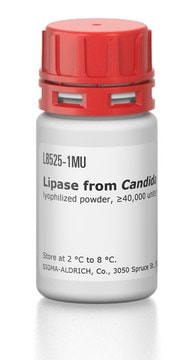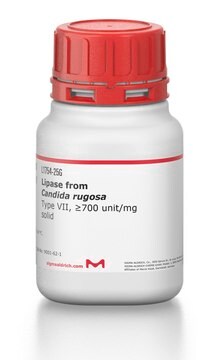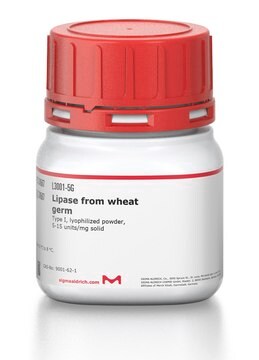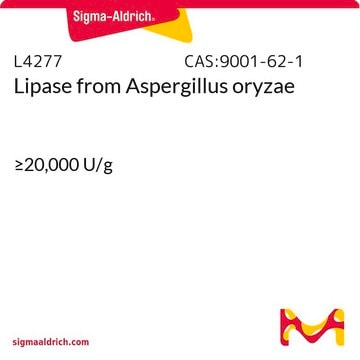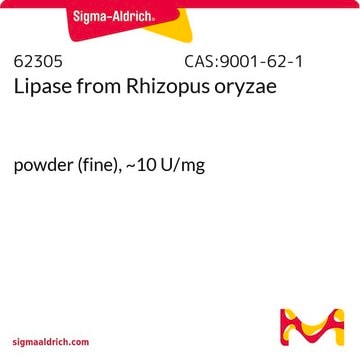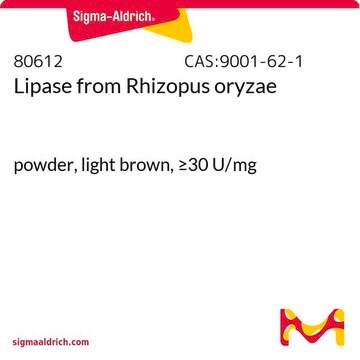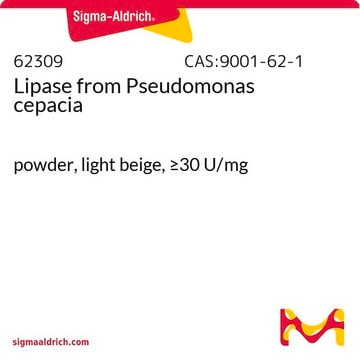L0382
Lipase from porcine pancreas
Type VI-S, ≥20,000 units/mg protein, lyophilized powder
Synonym(s):
PPL, Triacylglycerol acylhydrolase, Triacylglycerol lipase
About This Item
Recommended Products
type
Type VI-S
Quality Level
form
lyophilized powder
specific activity
≥20,000 units/mg protein
composition
Protein, 40-70%
shipped in
wet ice
storage temp.
−20°C
InChI
1S/C11H9N3O2.Na/c15-8-4-5-9(10(16)7-8)13-14-11-3-1-2-6-12-11;/h1-7,16H,(H,12,14);/q;+1/b13-9-;
InChI key
QWZUIMCIEOCSJF-CHHCPSLASA-N
Looking for similar products? Visit Product Comparison Guide
General description
Application
- in lipase inhibition assay with plant extracts
- in in vitro digestion gelatinized starch/fiber mixtures
- with simulated intestinal fluid to mimic the digestive tract condition of by L. fermentum PC1 in fermented oats
Biochem/physiol Actions
Lipases catalyze the hydrolysis of triacylglycerols into glycerol and free fatty acids.
Unit Definition
Analysis Note
Signal Word
Danger
Hazard Statements
Precautionary Statements
Hazard Classifications
Resp. Sens. 1
Storage Class Code
11 - Combustible Solids
WGK
WGK 1
Flash Point(F)
Not applicable
Flash Point(C)
Not applicable
Personal Protective Equipment
Regulatory Listings
Regulatory Listings are mainly provided for chemical products. Only limited information can be provided here for non-chemical products. No entry means none of the components are listed. It is the user’s obligation to ensure the safe and legal use of the product.
JAN Code
L0382-RSAMPLE:
L0382-1MU:
L0382-100KU:
L0382-VAR:
L0382-BULK:
Certificates of Analysis (COA)
Search for Certificates of Analysis (COA) by entering the products Lot/Batch Number. Lot and Batch Numbers can be found on a product’s label following the words ‘Lot’ or ‘Batch’.
Already Own This Product?
Find documentation for the products that you have recently purchased in the Document Library.
Customers Also Viewed
Articles
Lipid Induced Insulin Resistance
Our team of scientists has experience in all areas of research including Life Science, Material Science, Chemical Synthesis, Chromatography, Analytical and many others.
Contact Technical Service

